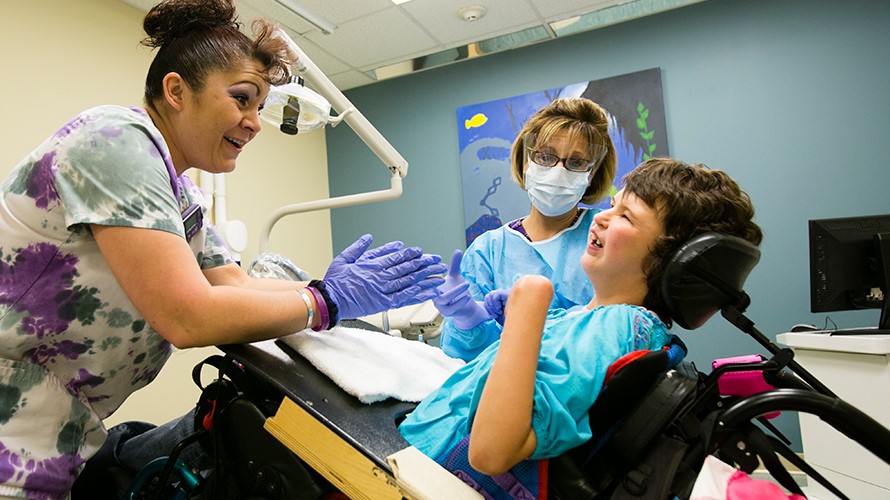Everyone deserves the best possible quality of dental care. If you want your dental clinic to be a place that welcomes all people, it is important to be proactive in your approach to care for one particular segment of the population: people with special needs.
As was recently noted in a paper from the National Centre of Biotechnology Information, the incidence of oral disease is much higher among adults with disabilities than in the general population, in part because people with special needs often struggle to get the same level of dental care.

In my years working in the dental industry, I have become convinced that providing high quality care to patients with special needs is the responsibility of all healthcare professionals, including dentists.
However, there are several barriers to oral health care often faced by those with special needs that every practitioner should be aware of:
- Language barriers
- Transportation issues
- Sensory impairments (including hearing and vision problems)
- Dental clinics that are not wheelchair accessible
- Psychosocial challenges, such as a lack of oral health literacy, general dental anxiety, as well as past negative experiences
- Cultural barriers, including health care providers without training in cultural competency in areas such as disability language and knowledge of how to treat patients with special needs
Adding education on treating patients with special needs to dental and dental hygiene curricula is a major step toward solving these issues, but progress is slow, and in the meantime, it’s up to individual dental practices to stay ahead of the curve.
To make our practices more open to people with special needs and our staff better equipped to provide a high standard of service to all people, we first need to understand both the challenges and rewards of treating these patients. Here are two things to keep in mind as you make your clinic more accessible for everyone:
“Special Needs” is a Broad Category
According to the American Association of Pediatric Dentists, in the context of healthcare a special need is “any physical, developmental, mental, sensory, behavioural, cognitive, or emotional impairment or limiting condition that requires medical management, health care intervention, and/or use of specialized services or programs.”
This means there is no single way to make your dental clinic more accessible: instead, you need to approach accessibility from a variety of different angles, always placing the patient at the centre of service.
In some cases, this may simply mean training your staff to be more sensitive to the needs and preferences of patients who may not be capable of using any automated patient communication you may have implemented or who may require additional support during check-ups. In other cases, it may mean making your clinic itself more accessible by removing barriers to entry and interaction with your staff.
In order to facilitate these different needs, it is important to pay attention to the work done by organizations like the National Council on Disability and the Canadian Public Health Association. These organizations have resources available to help you make your clinic more accessible to a broad range of patients.
Every Patient is an Individual
Perhaps most importantly, it is crucial to remember that people with special needs are individuals just like everyone else and deserve to be treated as such.
While technical tools can help you to keep track of needs that each of your patients has, it is also important to avoid stereotyping patients based on those needs. One of the most common mistakes that healthcare practitioners make when dealing with patients who have special needs is to foreground the disability, rather than seeing it as merely one aspect of a complex person.
Taken to an extreme, this can lead to problems like improper or insufficient pain management, or even a misdiagnosis. But even when this isn’t the case, overemphasizing the disability can make patients feel alienated and unseen.

For this reason, in addition to making sure your clinic can accommodate different needs, you should also strive to foster an environment in which the unique challenges faced by any person aren’t a barrier that keeps them from getting the care they deserve.
This does not need to require a complete overhaul of your approach to healthcare provision: as I have noted in previous blogs, making sure your front-line staff are generally trained to provide engaging and customer-centred care is essential to the success of your clinic.
You should view provision of care to patients with special needs as simply an extension of the high-quality care you provide to everyone who comes into your clinic.
As Sandie Baillargeon, owner of Dental Practice Consulting Services, states in her piece on interacting with clients that have disabilities or impairments, “Removing barriers to communication is the best way of building and sustaining a positive long term relationship with all of your clients”.
If we are to truly extend the same level of care and respect to all our patients, we will need to bear in mind that special needs come in a variety of different forms. Seeing the person rather than the disability is paramount to the provision of high quality service.



